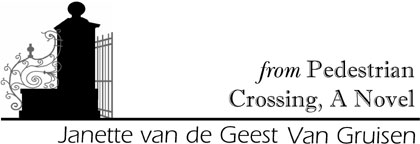




I
am not from here. You might tell, from my appearance or my voice,
that I am from another place, perhaps from another time. I come from
a place of endless rain and darker skies than you know here. I come
from a place where sunshine is a myth, a fairy tale we tell our children
so they might think that darkness is not all there is. But how cruel to
tell them, you say, when all we can give them is the myth, without a
thing to carry in their hand. Well, who can hold sunshine in his hand?
Not even you, who have so much of it: can you wake in the morning
and capture a day’s supply, mold it, hold and make it yours? No, and
nor can our children, beneath their dark sky, but here we have been
given an unholy gift for words because with them we must create so
much that we do not start out with. So we give our children light and
blue and gold and liquid words, and they take them from us and make
their stories, each child’s quite his own.
No, we are not cruel because we
are giving all we have. It is not
much, but we find, on the whole, it is almost as much as we need.
Except for a few of us, who will always go hungry. For us, a thousand
colored words are not enough; not for those like me who, despite our

Timshel Literature
fear that we will never find enough, still leave to go in search of more, of more than words, in search of something beyond darkness, dreams, and myths. We leave the familiar territory of deprivation and risk finding disappointment. But we leave. And those we leave behind? Some laugh, some love us for our courage, but mostly they just wave and turn away, back to their storytelling, back to their peculiar understanding of enough, of subsistence.
I am from there. I have tried to be from here, to live in your new perspective, but it eludes me still, after all these years.
I am one of three. The others lived with enough, or so they thought. I was the one who left them behind in what they knew as comfort. The middle one found out late that when comfort is thin it wears out sooner than it is outworn. She wants to leave now but cannot — she is in too deep. She made her bed with a thin coverlet, and into it children came and tied her heart to theirs, though her head and feet still roam, mostly in her dreams. It is too late for her, and I believe she knows it. Her core is dank and bitter now, despite the crisp sweetness of her children’s love. She has run out of fairy-tales, exhausted every myth, and has taken now to telling lies instead, at least to herself. What was once enough is no longer.
But I want you to know that it was not always dark where I come from. Long ago, before my time, there was a wealth of sunshine; there were green meadows, primroses on riverbanks, and the song of poor children dancing on brick streets.
I know these things not innately, but from knowledge imparted to me, and this was the reason for my leaving. The mother who made me told me of these things as if they existed only once, in a time that can never return, as if these scenes were frozen forever on a two-dimensional landscape that even the fiercest will could not restore to life. But somewhere beyond that landscape, I have since walked barefoot in those green meadows, seen primroses growing, and heard poor children singing loudly in the street, watched them dancing ever higher. That is why I left.
In the time before I left, no one expected that I would go, although I was born on a Thursday, and so it might have been predicted that I would travel far. But I was tiny and timid and so afraid of the dark all around that it took many silent years to gather the courage to open my eyes and see that there was indeed a door opening outward. It seemed the first few times I tried it there was another hand against the knob, holding me back. But too late, because now that I knew the door existed, I would find a way to pass through it. By that time, I had found a friend: Gordon had entered my life. “Jump,” he said, and he held my hand as, like two ghosts, we went blinking into the light, yet not disappearing, finding form and substance instead of evaporating. Perhaps we have never truly come to trust the light, or to believe in luck, for together, twenty years later, we still hold on to each other when the clouds eclipse the sun or the rains beat down or the electricity fails.
The door we stepped through slammed tightly behind us, and if we had wanted to shelter in it for a while as we surveyed the scene before us, the opportunity was not there. We had arrived in a bright and glaring place and were engulfed in a world of breathless heat, unworldly blossoms, the shrill of tin calypso, smiling toothless taxi drivers, and carnival food that was cooked in no mother’s kitchen.
Quite by accident, we lived amid this noise and heat and ribald color for a decade before we felt strong enough to move on, to leave the warmth behind. We swam with sparkling fishes for so long before we were sated with sun and lotuses. From the place of our childhood we had inherited disquiet, the promise of more. We wanted to know seasons, to feel the cold, to wake up from the numbness of unending ease and comfort. We wanted to grow up, grow old, to die living. But first we had to bleed.